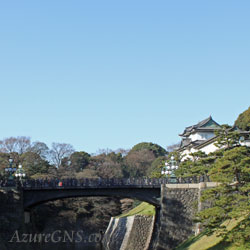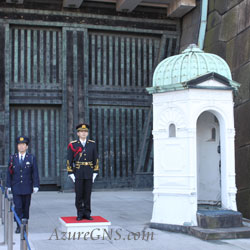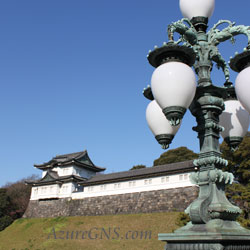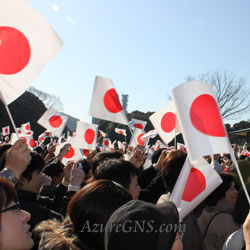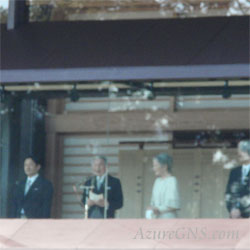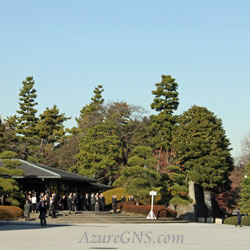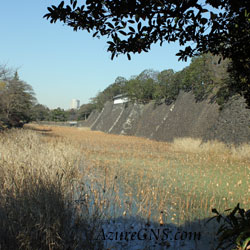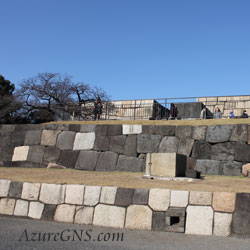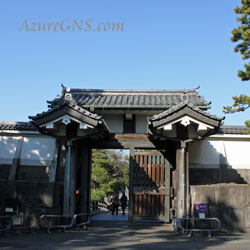国民の祝日
(12月23日)
National Holiday
Tenno-tanjobi;
The Emperor’s Birthday
(December 23rd)
●天皇誕生日 Tenno-tanjobi; the Emperor’s Birthday
●天皇 the Emperor; (天皇陛下)His Majesty The Emperor
●皇后 the Empress; (皇后陛下)Her Majesty The Empress
●皇太子 the crown prince; (皇太子殿下)His Imperial Highness The Crown Prince
●皇太子妃 the crown princess; (皇太子妃殿下)Her Imperial Highness The Crown Princess
●天皇誕生日一般参賀 Visit of the General Public to the Palace for the Emperor’s Birthday
●祝い celebration
●皇居 the Imperial Palace
●健康 health
●長寿 longevity
●神話 mythology; myth
●祖先 ancestor; foregather
●子孫 descendant
●宮内庁 the Imperial Household Agency
●皇宮警察 the Imperial Guard
◆日本の神話によると初代天皇の神武天皇が即位したのが紀元前660年です。
According to Japanese mythology, the first Emperor, Jinmu ascended to the throne in 660 B.C.
◆現在の天皇は神武天皇の直系の子孫で、126代目に当たるとされています。
The present Emperor is believed to be a direct descendent of Emperor Jinmu and is the 126th generation emperor.
◆神話では代々の天皇の先祖は天照大神とされています。
According to the myth, Amaterasu-Omikami, the Goddess of the sun is the ancestor of all the Emperors.
◆しかし歴史学者の中には、実際これらのことは歴史的根拠がないと考える人もいます。
Some historians, however, believe that such stories have no basis in fact.
◆最初の数代の天皇を除いて、江戸時代の終わりまで天皇が実際の統治権を持つことはありませんでした。
Aside from the early Emperors, many did not have complete sovereignty until the end of the Edo era.
◆明治維新により1868年(明治元年)に再び天皇が国を統治するようになりました。
With the beginning of the Meiji Restoration in 1868 (Meiji 1st yr), the Emperor ruled the nation once again.
◆明治時代、天長節は明治天皇の誕生日である11月3日でした。
During the Meiji era, Tencho-setsu was on November 3rd which is the Emperor Meiji’s birthday.
◆現在、11月3日は国民の休日の文化の日になっています。
Today, November 3rd is Cultural Day which is a national holiday.
◆第二次世界大戦後、天皇は統治せず、単なる国の象徴となりました。
At the end of World War ll, the Emperor no longer ruled, but merely became a symbol of the nation.
◆第二次世界大戦が終わるまで、天皇誕生日は天長節として祝っていました。
Before the end of World War ll, the Emperor’s birthday was called Tencho-setsu.
◆1948年(昭和23年)国民の祝日が見直され、天長節は天皇誕生日に名称が変わりました。
However, Tencho-setsu was renamed The Emperor’s Birthday after the restructuring of national holidays in 1948 (Showa 23rd yr).
◆昭和天皇の誕生日は4月29日で、現在は「昭和の日」になり、国民の祝日です。
The Showa Emperor’s birthday was April 29th which is now “Showa-no-hi” (Showa Day), also a national holiday.
◆今上天皇の誕生日は12月23日で、国民の祝日です。
The present Emperor’s birthday is December 23rd and is a national holiday.
◆天皇誕生日には多くの人が皇居に参賀に訪れます。
On the Emperor’s birthday, many people visit the Imperial Palace.
◆人々は手に日本の国旗である日の丸の小旗を持って来ます。
Visitors come bearing small Japanese flags, Hinomaru (the Rising Sun flags).
◆天皇のご健康とご長寿を祈り、天皇のために万歳をします。
They pray for the Emperor’s health and longevity and cheer (banzai) for the Emperor.
◆天皇皇后や皇族の方々がバルコニーに出て人々の祝福にお応えになります。
The Emperor, the Empress and some of the members of the Imperial Family make an appearance on the balcony to acknowledge the well-wisher’s blessings.
◆天皇は短いご挨拶を人々になさいます。
The Emperor gives a short greeting to the public.
◆天皇誕生日には皇居内の普段解放されていない場所の一部に入ることができます。
On the Emperor’s Birthday, visitors can enter some areas in the Imperial Palace which are normally off-limits.
(より詳しい情報は「我が家の天皇誕生日」を覧下さい。)
(Please see “Our Emperor’s Birthday Experience” for further information.)
Copyright (C) Azure Global Network Services. All Rights Reserved.
